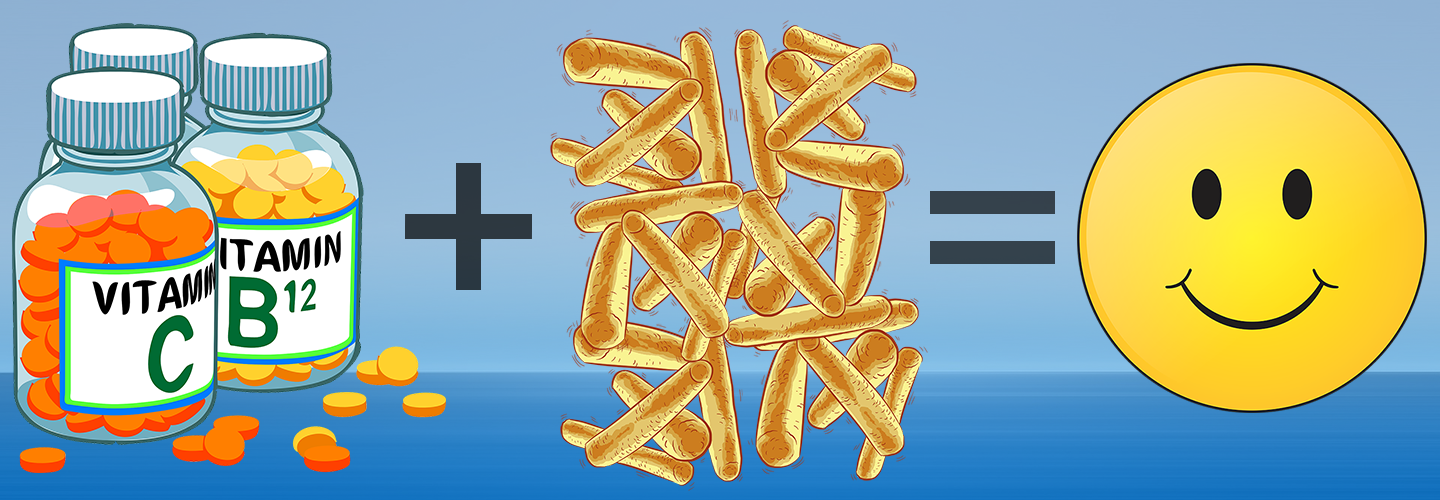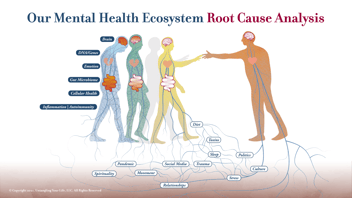Supplements and Probiotics: A Prescription Pad Isn’t The Only Tool In Your Doctor’s Bag for Anxiety and Depression Treatment
- Home
- Blog

Often you go to your doctor’s office just to get the infamous 15 minute “med check,” where your doctor has no choice but to do a quick rundown of symptoms and side effects without ever discussing what else is going on with your body. Psychology Today even posted an article about how to navigate the med check because this is so common. But there’s a new movement growing, where doctors understand the importance of treating the whole person and using alternative medicine in combination with prescriptions. A large part of this trend is the use of supplements.
Study finds supplements can bolster effects of antidepressants
The American Journal of Psychiatry just published in April of this year the results of a major study from researchers based at Harvard and the University of Melbourne that found that supplements such as fish oil, methylfolate (a form of the B vitamin folate that the body can more readily use) and Vitamin D can boost the effects of antidepressants in patients suffering from clinical depression. Most of us have heard that omega-3 and omega-6 fatty acids help brain functioning and mood, but only now does evidence suggest that these antioxidants may directly alter neurotransmitter activity and indirectly reduce inflammation. This has huge implications for patients who have failed to respond to several treatment attempts with antidepressants alone—about two-thirds of antidepressant users do not respond to the first medication they try and a third fail to get better after trying several rounds of medications. One of the lead researchers said that adding omega-3 EPA (eicosapentaenoic acid) is “…a potential low-cost approach to reducing depression in people who are non-responsive to antidepressants.” Similar positive results were shown in a study back in 2015 of children ages 7-14 who suffered from depression, where children were given several types of omega-3 fatty acids, including 1400mg of EPA, 200mg of DHA, and 400mg of other types of omega-3 fatty acids per day showed signs of improvement.
Vitamins and probiotics can reduce mental and emotional distress and help in the treatment of anxiety and depression
Vitamins and Probiotics aren’t just for people with digestive issues, either. A French study found that subjects who took probiotics for 30 days had reduced levels of mental and emotional distress, and probiotics in fermented foods like sauerkraut, miso soup and kefir can even relieve social anxiety and improve memory. A study out of UCLA showed that women who ate yogurt regularly had decreased activity in the brain regions that process emotion after being shown stressful images—meaning that their response to fear was reduced. The brain sends signals to the gut, which is why stress and other emotions can cause stomach problems, but we now know that these signals travel the opposite way as well, “the gut-brain axis.” Having a diverse population of bacteria in your gut is very involved in signaling pathways to the brain that can help alleviate symptoms of depression and anxiety. I will be writing more about how the flora (or microbiota) in your colon has a huge impact on your brain health in future posts.
Future posts will also cover how certain vitamin D supplementation was also found to help patients with depression and other conditions like multiple sclerosis, schizophrenia and bipolar spectrum disorders. In children with bipolar conditions, for example, vitamin D3 supplementation can decrease manic and depressive symptoms by targeting the GABA receptors, which have been linked to the manic phase of bipolar disorder when they are not working properly. There is already a high incidence of vitamin D deficiency in Americans—nearly 23 million people—so it is important to get tested even if you do not have a mental health condition. It can be detected through a routine blood test, along with other vitamin and nutrient levels. Roughly 1 out of 3 American adults has at least one vitamin or mineral deficiency, and detecting deficiencies should be one of the first things that your doctor should do to treat any health condition.
Genetic variations that affect brain functioning may respond to a combination of supplements and prescription medications
Supplements should not replace prescription medications in all cases, and each person responds to treatments differently. Supplements have also come under a lot of scrutiny because the Food and Drug Administration does not evaluate a particular brand of supplement’s contents or effectiveness before it becomes available to consumers, unlike the strict pre-market approval process that prescription drugs undergo. Consumer Reports recommends referring to FDA.gov, MedlinePlus.gov , and USP.org to verify that your supplement contains the ingredients it claims to have. However, I do believe it is time for psychiatry to experience another major shift in focus away from just prescribing Big Pharma medications and hoping for the best, toward thinking outside the box and using all the resources available to us to make our patients feel better sooner.
Related Information
- Learn about Genetic Testing
- Learn about Potomac Psychiatry
- Meet Our Doctors
- Contact Potomac Psychiatry
.png?width=144&height=144&name=Untitled%20design%20(34).png)



